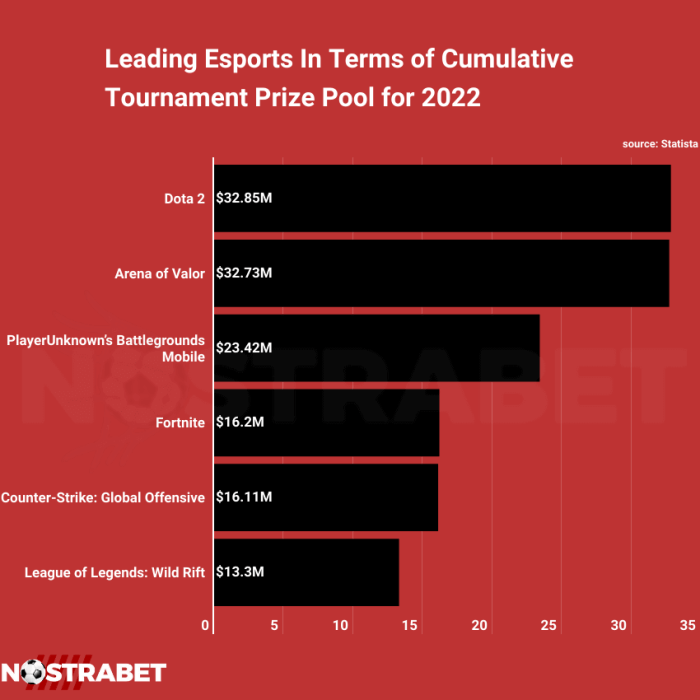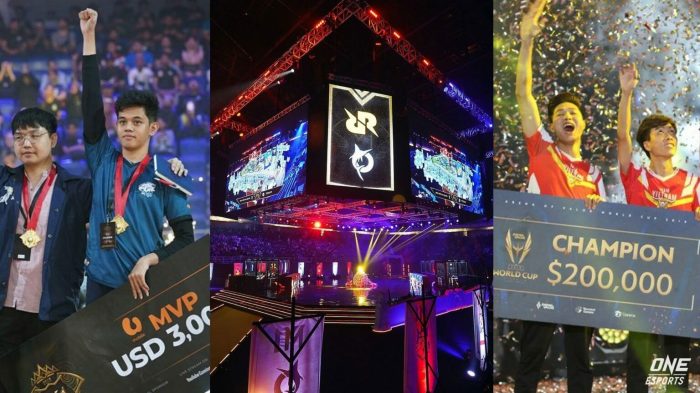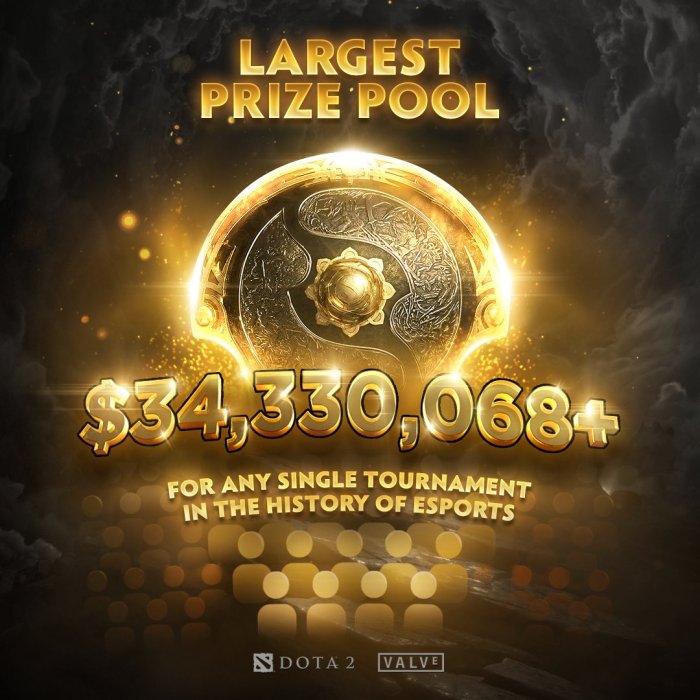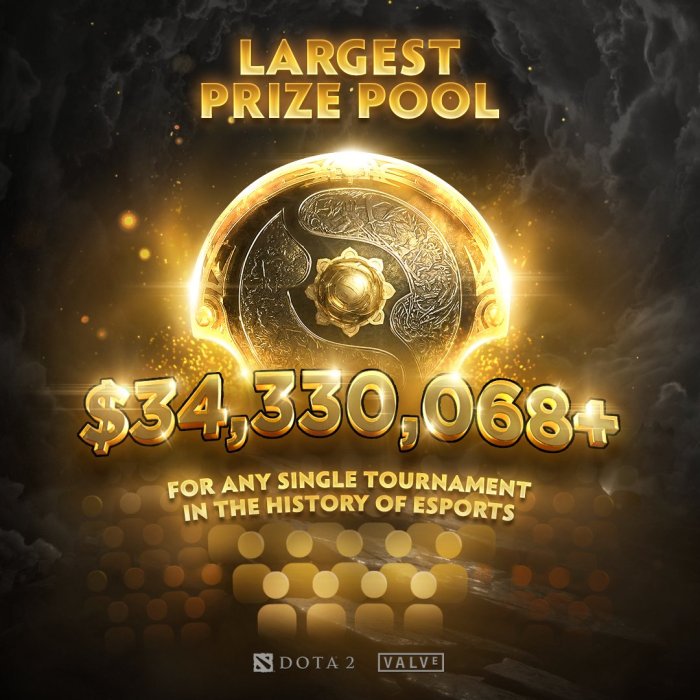Esports Prize Pools: Seriously, have you seen the numbers lately? We’re talking millions, even tens of millions of dollars up for grabs in some tournaments. This isn’t just about bragging rights anymore; it’s a massive industry fueled by passionate players, savvy sponsors, and a global audience glued to their screens. This exploration dives into the history, factors, and future of these eye-popping prize purses.
From humble beginnings to the mega-events we see today, the evolution of esports prize pools is a wild ride. We’ll unpack how game popularity, sponsorships, and media coverage all contribute to the ever-increasing amounts at stake. We’ll also analyze how the money is distributed—is it fair? Is it effective? And what impact does it have on the players, the games, and the industry as a whole?
Factors Influencing Prize Pool Size

Esports prize pools, the alluring carrot dangling before the eyes of competitive gamers, aren’t magically conjured. Their size is a complex interplay of several key factors, each contributing to the overall pot of gold at the end of the rainbow. Understanding these factors is crucial for both aspiring esports professionals and those invested in the industry’s growth.Game Popularity and Player Base Significantly Impact Prize PoolsThe foundation of any successful esport is the game itself.
A massive and engaged player base translates directly into higher viewership, sponsorship interest, and ultimately, larger prize pools. Games like League of Legends and Dota 2, with their millions of players and dedicated communities, consistently boast some of the largest prize pools in the world. This is because a large player base translates into a large potential audience for sponsors and a higher likelihood of significant media coverage.
Conversely, smaller, niche esports titles may struggle to attract the same level of investment.
The Role of Sponsorships and Brand Deals
Sponsorships and brand deals are arguably the most significant driver of prize pool growth beyond publisher investment. Companies see the value in associating their brands with the excitement and reach of esports. Major brands, recognizing the lucrative demographic of esports viewers, are willing to invest heavily in sponsorships, directly contributing substantial sums to prize pools. For example, energy drink companies, gaming hardware manufacturers, and even car manufacturers are now frequent sponsors in major esports tournaments, significantly boosting the prize money available.
These deals often come with specific stipulations, such as prominent brand placement during broadcasts and social media promotions.
The Impact of Viewership and Media Coverage
Viewership and media coverage are intrinsically linked to sponsorship opportunities. High viewership numbers demonstrate a large and engaged audience, making esports a more attractive investment for sponsors. Positive media coverage, both traditional and online, further enhances this appeal. The more eyes on the competition, the greater the potential for brand exposure, making sponsors more willing to invest in larger prize pools.
Major tournaments, televised or streamed on platforms like Twitch and YouTube, generate massive viewership, attracting sponsors who recognize the potential for substantial return on investment. Think of the massive viewership of the League of Legends World Championship, a prime example of how significant media coverage can attract substantial sponsorship deals.
Factors Contributing to Prize Pool Size
| Factor | Description | Impact on Prize Pool Size |
|---|---|---|
| Game Popularity | The number of players, engagement level, and overall community size of the game. | Directly proportional; larger player base leads to higher viewership and sponsorship interest. |
| Sponsorships and Brand Deals | Financial investments from companies seeking brand exposure through esports. | Significantly increases prize pool amounts; often the primary driver of large prize pools. |
| Publisher Investment | Financial contributions from the game developers or publishers themselves. | Provides a base level of funding, and can be significant for established franchises. |
| Viewership and Media Coverage | The number of viewers watching tournaments and the extent of media attention received. | Attracts sponsors and increases the perceived value of the event, leading to larger prize pools. |
Impact of Prize Pools on Esports

Massive prize pools have fundamentally reshaped the esports landscape, transforming it from a niche hobby into a globally recognized competitive industry. The sheer financial incentive offered by these pools has dramatically altered the motivations, dedication, and overall professionalism of players and organizations alike. This influence extends to attracting top talent, intensifying competition, and driving the overall growth of the industry.Large prize pools act as a powerful magnet, attracting top-tier professional players to the esports scene.
The potential for significant financial gain incentivizes individuals to dedicate their lives to honing their skills and competing at the highest level. This is especially true for players who might otherwise struggle to find lucrative career opportunities. The promise of life-changing money draws in the most skilled and dedicated individuals, creating a highly competitive environment.
Attracting Professional Players
The allure of substantial prize money is a primary driver for individuals choosing esports as a career path. Consider the example ofDota 2’s* The International tournament, which consistently boasts prize pools in the tens of millions of dollars. This level of prize money attracts not only skilled players but also significant sponsorships and investment, creating a sustainable ecosystem where players can earn a living wage and even achieve significant wealth.
The sheer scale of these rewards makes esports a viable and attractive career option, drawing talent away from traditional sports and other fields. Many players who might have otherwise pursued different paths are drawn to the potential financial rewards offered by high-stakes esports competitions.
Influence on Competition and Skill
Increased prize pools directly correlate with a higher level of competition and skill within esports. When substantial financial rewards are at stake, players are more motivated to dedicate themselves to rigorous training, strategic analysis, and continuous improvement. This heightened dedication leads to a more refined meta, innovative strategies, and an overall increase in the skill ceiling of the game.
The pressure to perform at the highest level, fueled by the potential for substantial financial gain, pushes players to constantly refine their abilities and outmaneuver their opponents.
Growth and Professionalism of the Esports Industry
The impact of large prize pools extends beyond individual players; they significantly contribute to the overall growth and professionalism of the esports industry. Larger prize pools attract more sponsorships, investment, and media attention, leading to increased visibility and broader appeal. This, in turn, fosters a more stable and sustainable ecosystem, enabling the development of better infrastructure, more sophisticated organizations, and improved player support systems.
The higher level of professionalism contributes to a more legitimate and respected industry, making it more attractive to investors, sponsors, and mainstream audiences.
Motivation for Skill Improvement and Training
Prize money serves as a powerful motivator for players to improve their skills and dedicate more time to training. The prospect of winning a substantial sum pushes players to analyze their gameplay, identify weaknesses, and develop new strategies. This dedication to improvement leads to a continuous cycle of refinement, innovation, and ultimately, a higher overall level of skill within the competitive scene.
For instance, many professionalLeague of Legends* players dedicate countless hours to practicing specific champion matchups, reviewing replays, and studying their opponents’ strategies, all driven by the potential rewards of tournament victories. The direct link between effort and financial reward provides a strong incentive for players to invest heavily in their training and self-improvement.
The Future of Esports Prize Pools

Predicting the future of esports prize pools is like trying to guess the next big game – challenging, but undeniably exciting. We’ll see continued growth, but the distribution of that growth and the technologies involved will likely undergo significant shifts. Expect a more complex and potentially more decentralized landscape in the coming years.
Prize Pool Growth and Distribution Trends
Several factors will influence the growth and distribution of esports prize pools. Increased viewership and sponsorship dollars will undoubtedly contribute to larger prize pools. However, we can also expect to see a more diverse distribution of prize money, with smaller tournaments and less popular games receiving a larger share of the pie. This is partially driven by the rise of grassroots esports and the increasing accessibility of streaming platforms, which allow for more opportunities for smaller tournaments and independent organizers.
For example, while major championships like The International (Dota 2) will continue to boast massive prize pools, we’ll see a proportionate increase in prize money allocated to regional leagues and smaller-scale competitions, fostering a more inclusive and competitive ecosystem. This is similar to how the traditional sports world has seen a rise in smaller leagues and independent teams gaining more financial stability and recognition.
The Role of New Technologies
Blockchain technology and NFTs (Non-Fungible Tokens) are poised to revolutionize how esports prize pools are managed and distributed. Blockchain’s transparent and secure nature can improve the integrity and traceability of prize money distribution, minimizing fraud and ensuring fairness. NFTs can create new avenues for fan engagement and revenue generation, potentially allowing fans to own pieces of prize pools or even vote on prize pool distribution.
Imagine a scenario where fans can buy NFTs that grant them a percentage of the prize pool for a specific tournament. This creates a direct financial incentive for fans to support their favorite teams and players, further fueling the growth of esports. This mirrors the evolution of traditional sports, where fans now have diverse ways to engage and invest, from season tickets to fantasy leagues.
Challenges and Opportunities, Esports Prize Pools
The continued growth of esports prize pools isn’t without its challenges. Maintaining the integrity of prize pools and preventing manipulation will be crucial. Regulation and oversight from governing bodies will play a vital role in addressing these concerns. Another challenge lies in ensuring equitable distribution of prize money across different regions and games. Opportunities lie in leveraging new technologies to enhance fan engagement, transparency, and the overall economic viability of the esports ecosystem.
Strategic partnerships between esports organizations, game developers, and technology companies will be essential to navigate these challenges and capitalize on the opportunities. For example, a partnership between a blockchain company and a major esports tournament could lead to a completely transparent and verifiable prize pool distribution system, increasing trust and fan engagement.
Hypothetical Esports Prize Pool Landscape in 2030-2035
In 2030-2035, the esports prize pool landscape will be significantly more diversified and technologically advanced. Major championships will continue to boast multi-million dollar prize pools, but a substantial portion of the overall prize money will be distributed across a broader range of smaller tournaments and niche games. Blockchain technology will be widely adopted, ensuring transparency and security in prize pool management.
NFTs will play a key role in fan engagement, with fans potentially owning fractional shares of prize pools or receiving unique digital collectibles based on tournament outcomes. We might even see the emergence of decentralized autonomous organizations (DAOs) managing prize pools, empowering the community to have a direct say in how prize money is allocated. This evolution would resemble the diversification of funding and fan engagement seen in traditional sports, with more avenues for participation and investment.
Imagine a scenario where a successful amateur tournament, entirely managed through a DAO, boasts a prize pool rivaling smaller professional leagues, demonstrating the power of decentralized systems and community engagement.
FAQs
What’s the smallest esports prize pool ever?
Pinpointing the absolute smallest is tough, as early tournaments often lacked formal records. However, many early competitions offered relatively modest prizes, sometimes just a few hundred dollars or even gaming equipment.
How are prize pools taxed?
Tax laws vary by country and region. Players usually need to declare and pay taxes on their winnings, just like any other income. The specific rules depend on where the tournament is held and where the player resides.
Are there any ethical concerns about massive prize pools?
Absolutely. Concerns include potential for match-fixing, the pressure on players, and the widening gap between top earners and the rest of the competitive scene. These issues require ongoing discussion and solutions within the esports community.
